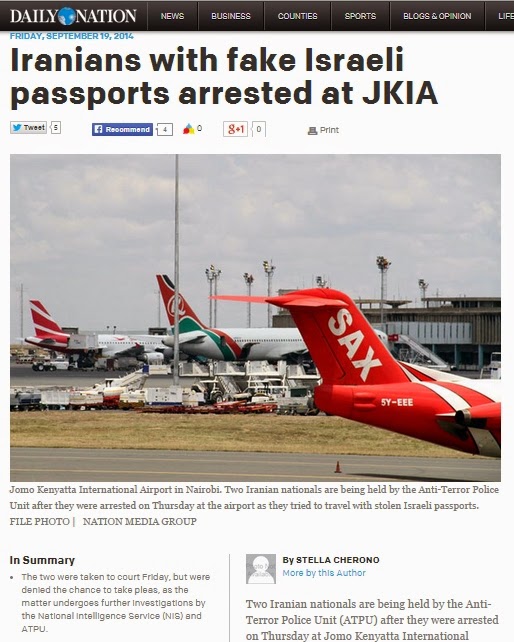 |
| The arrested Iranians with their Kenyan driver, in the dock of the court and in handcuffs in a December 3, 2016 Reuters photo [Source] |
Not to sound rude, but how well do the Kenyan authorities understand what it means to pursue counter-terror co-operation with the Islamic Republic of Iran? We have had our doubts in the past (see "24-Jul-15: Terror here? 'Ridiculous' say Kenyans, deploying their largest ever security blanket" and "16-May-14: More jihadist killings in East Africa today" and "27-Sep-13: Freeing terrorists and the Nairobi massacre"). If the US State Department doesn't return their calls (and the State Department knows a lot about Iranian terror even if they don't always own up to it), the Kenyans could go searching on the web. A good starting point might be "Iran and state-sponsored terrorism" from Wikipedia.Turns out they didn't pay any attention to our advice on this, which in the circumstances is a real pity. A syndicated Reuters report from December 2, 2016, already conveyed a sense what might be ahead ["Iran urges Kenya to free two Iranians facing terrorism charges: Tasnim", Reuters].
Then the "semi-official" Iranian media chimed in.
Iran's Ambassador to Nairobi Hadi Farajvand announced that the country's mission is seriously pursuing freedom of the two detained Iranian nationals in Kenya, stressing that the media ballyhoos on the case are aimed at distorting the good relations between the two countries... The Iranian foreign ministry said that the two Iranians, namely Abdolhossein Safayee and Seyed Nasrollah Ebrahimi, who are lawyers and university instructors, are now in Nairobi as lawyers of the families of two Iranian prisoners in Kenya to probe into the case of the inmates and provide them with legal advice... Farajvand voiced deep regret over releasing such "baseless" media reports, and said they are merely aimed at destroying the friendly and growing ties between Tehran and Nairobi. He also expressed the hope that given the fact that the two Iranian nationals are prominent lawyers, the process to pursue the case would not be affected by the ballyhoos of ill-wishers and the two lawyers would be freed soon through good interaction between the Kenyan government and judiciary... Kenyan Ambassador to Tehran was invited to Iran Foreign Ministry on Thursday evening to be informed of Tehran's protest. "Tehran asked the Kenyan party to seriously look into the issue, while emphasizing prompt release of the two Iranian citizens," he added. [FARS News, December 3, 2016]In Kenya, the local media expressed it very much more bluntly:
The Iranian government on Friday ordered the Kenyan government to set free two of its nationals arrested by the Anti-Terrorism Police Unit... [Iran] rubbished the terrorism link saying that the two were government lawyers on an official assignment. [A Kenyan news site, December 3, 2016 - archived by us in case the source disappears]So having been ordered by the Islamic Republic, here's what happened in Nairobi today:
Kenyan court has ordered the deportation of two Iranian men who were accused of plotting an attack on the Israeli embassy in the capital, Nairobi. A court order issued Wednesday said an agreement had been reached between prosecutors and the Iranian Embassy leading to the termination of criminal charges and deportation. The suspects, Sayed Nasrollah Ebrahim and Abdolhosein Gholi Safaee, had been in custody since November 29, when they were arrested outside the Israeli Embassy with video footage of the facility. They had been traveling in an Iranian diplomatic car after visiting a prison where they saw two other Iranians who have been jailed for 15 years on terrorism charges, according to prosecutors. They were charged with collecting information to facilitate a terrorist act. Iranian agents have been suspected in attacks or thwarted attacks around the globe in recent years, including in Azerbaijan, Thailand and India. Most of the plots had Israeli targets. ["Kenya drops charges, deports Iranians thought plotting attack on Israelis", Associated Press via Times of Israel, December 14, 2016]Sounds to us like a serious and regretable Kenyan mistake. Meanwhile on a completely unrelated subject:
Iranian Defense Minister Hossein Dehghan, while speaking at a conference in Tehran, said that were President-Elect Trump to withdraw from the Iranian nuclear “deal” signed by the Obama administration, Iran would destroy the State of Israel... ["Iran threatens to destroy Israel - again", Washington Times, December 12, 2016]














